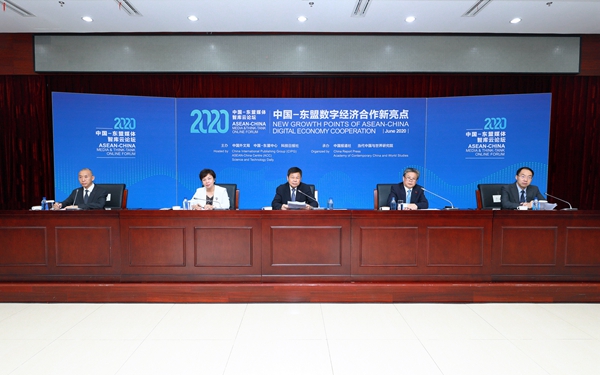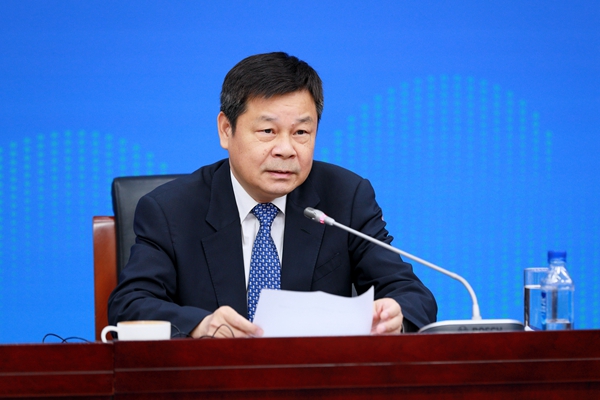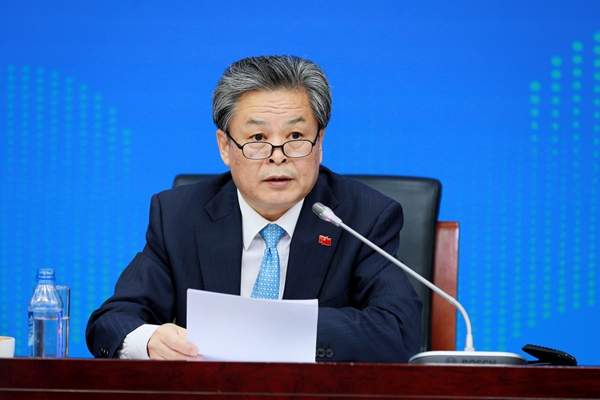
The year 2020 marks the ASEAN-China Year of Digital Economy Cooperation. To further strengthen international cooperation and explore the potential of economic cooperation between ASEAN countries and China under the conditions of normalized COVID-19 prevention and control, the ASEAN-China Media & Think-Tank Online Forum was held on June 9 with the theme of "New Growth Points of ASEAN-China Digital Economy Cooperation." The event was jointly hosted by China International Publishing Group (CIPG), ASEAN-China Centre (ACC) and Science and Technology Daily (STD), and co-organized by China Report Press (CRP) and the Academy of Contemporary China and World Studies (ACCWS) under the CIPG. CIPG President Du Zhanyuan, ACC Secretary-General Chen Dehai, STD President Li Ping, Ambassador of the Philippines to China Jose Santiago L. Sta. Romana as well as CIPG Deputy Editor-in-Chief and CRP President Chen Shi addressed the meeting. The event also invited around 70 other guests from information authorities of China and ASEAN countries, AMS embassies in China, academies, media and international organizations, including Bruneian Ambassador to China Pehin Dato Rahmani Dato Basir, Malaysian Ambassador to China Raja Dato' Nushirwan Zainal Abidin, Thai Ambassador to China Arthayudh Srisamoot, Indonesian Ambassador to China Djauhari Oratmangun, Chairman of Thailand-China Research Centre of the Belt and Road Initiative Gen. Surasit Thanadtang, President of Confederation of ASEAN Journalists Thepchai Sae Yong, Associate Editor and ZB CUM Editor of Singapore-based Lianhe Zaobao Han Yong Hong, Senior Researcher of International Liaison Bureau of the State Council Information Office of China Dong Guoping, STD Vice President Fang Hanting and ACCWS President Yu Yunquan and Vice President Yang Ping.

Du Zhanyuan pointed out in his speech that in the face of the sudden outbreak of COVID-19, China and ASEAN countries worked together to pull through the trying time, setting the standard for international cooperation in the fight against the pandemic. He also noted that the white paper Fighting COVID-19: China in Action recently published by China's State Council Information Office highlights the commitment of the Chinese government to put people's lives and health first. Du stressed that the epidemic did not change the overall trend of globalization, with the digital economy as a major driver. Focusing on cooperation in digital economy will help elevate ASEAN-China cooperation to a new level and futher accelerate regional integration, he added.

Chen Dehai said that since the COVID-19 outbreak China has fought shoulder to shoulder with ASEAN member states, which demonstrated the long-standing friendship between the two sides. He approved of the special significance of this online forum which echoes the theme of ASEAN-China Year of Digital Economy Cooperation and provides a new platform for media outlets and think tanks from both sides to exchange views with the help of digital technology on how to promote bilateral cooperation in digital economy and better share digital information as COVID-19 continues.
Li Ping remarked that in the context of global fighting against COVID-19, developing digital economy is quite essential as it will stabilize employment and investment and will promote the digital transformation and intelligent upgrade of industries. He also pointed out that working together to overcome the ongoing difficulties and maintaining regional stability and development is an urgent task for regional cooperation at this moment. As the digital economy has become a new engine for innovation-driven development, ASEAN-China cooperation in this area enjoys a bright prospect and media and think tanks can contribute to such cooperation amid the COVID-19 pandemic and beyond.
In his speech, Amb. Romana recognized the concerted efforts made by China and ASEAN countries in combating the unknown disease. He believed promoting digital economy can help hedge the impact of the epidemic on the global economy. To adapt to the current situation and achieve development goals at national, regional and global levels, ASEAN countries should learn from China's experience in developing e-commerce and mobile payment and strengthen bilateral cooperation in this field.
When addressing the forum, Chen Shi said that with their advantages in communication, platform building and talent, media organizations and think tanks have an important role to play in pooling resources for expanding ASEAN-China cooperation in digital economy.
In the following session discussion, eight Chinese and ASEAN speakers shared their views on two topics: "opportunities and potentials for ASEAN-China digital economy cooperation in the post COVID-19 era" and "facilitate information sharing between ASEAN and China by media and think-tanks."
In the first session moderated by Dino Kusnadi, Minister and Deputy Chief of Mission of the Indonesian Embassy in Beijing, Gen. Surasit Thanadtang believed that the strategic cooperation between Thailand and China in the field of digital economy is crucial and ASEAN countries can learn from China's experience in national governance and epidemic prevention and control. Liu Zhengfu, Deputy Director-General of the Department of Development Research of China Council for the Promotion of International Trade (CCPIT), suggested the two sides should enhance policy coordination and deepen practical cooperation by tapping the potential of trade and investment promotion organizations and chambers of commerce. As a senior journalist, Han Yong Hong gave a brief analysis of the prospect of ASEAN-China digital economy cooperation, noting that collaboration in personnel training and data connection between the two sides should be strengthened. Gu Qingyang, an associate professor of the Lee Kuan Yew School of Public Policy of National University of Singapore, shared his insights on smart city construction. He believed bilateral cooperation in this area has a promising future.
Arianto Surojo, Director of ACC Information and Public Relations Division, chaired the second session. Fang Hanting, Vice President of Science and Technology Daily said that China and ASEAN countries enjoy broad prospect in their digital economy cooperation, adding that both sides should carry out complementary research and development (R&D) cooperation, jointly promote technological progress and share R&D achievements with each other. Yang Ping, Vice President of ACCWS, expounded on the role of think tanks in enhancing digital information sharing between ASEAN and China, which she summarized as intellectual support in the field of international communication. Thepchai Sae Yong believed that media outlets and think tanks should play an active role as the COVID-19 pandemic brought both challenges and opportunities. Irfan Ilmie, head of Beijing Branch of Antara News Agency of Indonesia, shared a touching story of Indonesian policemen writing a song to cheer up the Chinese people in their fight against the virus, which moved all participants of the forum.
The ASEAN-China Media & Think-Tank Online Forum was the first of its kind in using digital technology, receiving support from the AMS embassies in Beijing and attracting widespread media attention. During the forum, ACCWS President Yu Yunquan also had an online release of a multilingual E-book titled Keywords to Understand China: The Fight Against COVID-19. The event was livestreamed on June 16 on media platforms including China.com.cn, Bilibili.com, Sina.com.cn and V.qq.com, etc.